17 Outdated Office Etiquette Rules That Are So Laughable Today

From not knowing if you should offer your coworkers hugs rather than high-fives to worrying about what’s too casual for a Casual Friday, the world of office etiquette can feel like a minefield. However, as the work environment becomes less stuffy, some of those old-fashioned rules about manners on the job are flying out the window. In fact, they look laughably outdated by today’s standards. If you’re wondering which rules you can afford to break, read on.
1
Addressing all communications as “Dear Sir”
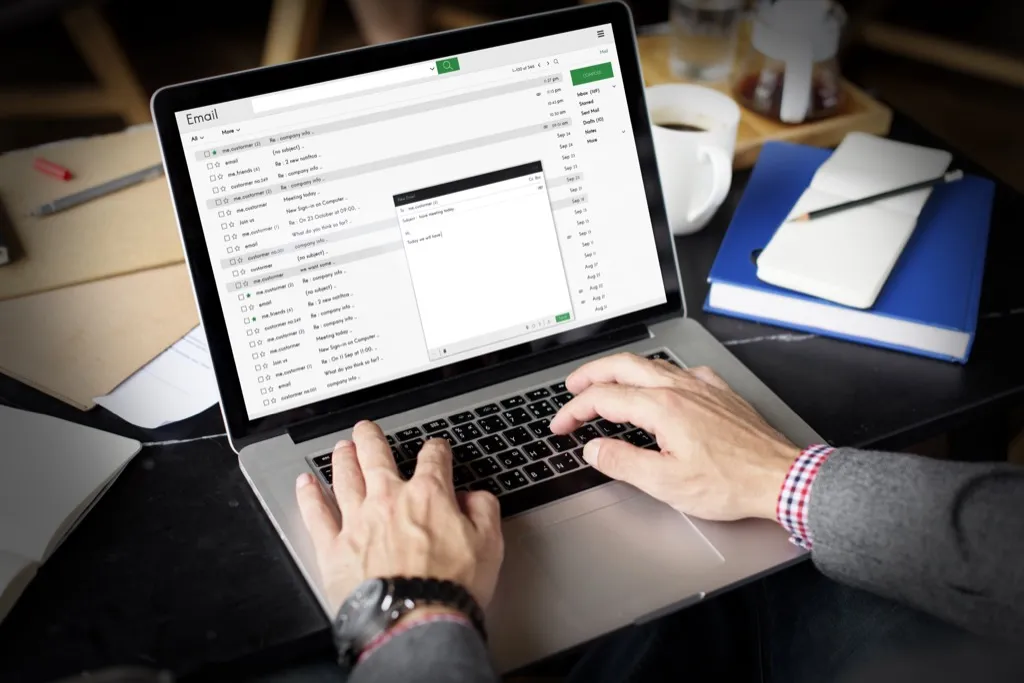
Think starting your email with “proper” salutation—like “Dear Sir” or “Dear Miss”—is a surefire way to convey respect? Think again.
“Greeting a stranger with ‘Dear Sir’ in a letter or email can be perceived in a negative light, especially in the #MeToo and #TimesUp era,” says Bonnie Tsai, founder and director of Beyond Etiquette, a consulting agency specializing in full-service etiquette and communication training for companies and individuals. “Usually, [you can] find the person’s name through a Google or LinkedIn search and address them by their name—it’s also more personal this way. If you can’t find a name, you can use ‘To Whom It May Concern,’ or address it to the title of the person you want to speak with, like their head of Human Resources.”
2
Not displaying photos of your family on your desk

More and more companies are starting to realize that, in order to boost employee retention, they need to get to know their workers first. As a result, rules allowing little to no crossover between your personal and professional lives are becoming increasingly antiquated. In an essay for The Atlantic, Brown University economist Emily Oster suggests that making a person’s family life known—through the decoration of their work space and by bringing it up in conversation—can help normalize the idea of a working parent having non-work commitments.
“Displaying your personal photos makes you relatable,” says Toni Dupree, founder of Etiquette And Style By Dupree, a Houston-based etiquette and finishing school. “When your employees see the photos of your family, it makes them feel that you have an understanding of family and situations that affect them.”
3
Waiting for a woman to extend her hand before offering yours to shake

While this rule was once common in workplaces, according to Tsai, it’s now seen as outdated in the etiquette world. “The general rule is the host or the higher-ranking individual should extend their hand out to welcome the other party,” she says. “However, if the host or senior-ranking individual doesn’t extend their hand immediately after you meet, the other party should extend theirs.”
4
Never eating at your desk

Sure, few people relish the experience of sitting next to a coworker who’s consuming something pungent at their desk. But the idea that nobody should eat at their desk, ever, is pretty antiquated. In fact, according to a 2017 study out of The Hartman Group, 52 percent of workers polled admitted to typically eating lunch alone at their desks. “Depending on the type of work you do, eating at work is necessary,” says Dupree.
5
Remaining seated when being introduced (if you’re a woman)

That’s right: As silly (and sexist) as it may seem, women in the workplace were once expected to stay seated when being introduced, according to Tsai. However, even if you once-upon-a-time abided by that rule, staying seated when meeting someone looks rude by today’s standards. “When you stand to greet someone, it not only shows that you are eager to meet and welcome them, but also that you’re standing up out of respect for who they are,” says Tsai.
6
Never using casual language in emails

While it may not be a smart move to refer to your company’s CEO as “Man” or to toss swear words into chats with colleagues, more casual communication styles are becoming the norm, not the exception, in many workplaces. According to a 2017 study conducted by productivity software company Boomerang, emails that started with the casual “Hey” yielded 7.5 percent more responses than those that started with the more formal “Dear.”
However, even if your tone is informal, etiquette expert Karen Thomas, founder of Karen Thomas Etiquette, recommends still using proper grammar and punctuation as a means of showing respect.
7
Always toasting with an alcoholic drink at office celebrations

Whether your company had a major sale or you were celebrating an employee’s birthday, it was once standard practice to raise your glass—full of alcohol—to show your appreciation. “It used to be seen as bad luck if you toast with a non-alcoholic drink,” says Tsai. “However, nowadays, there may be a multitude of reasons why people choose not to consume alcohol including dietary choices, religious faiths, or simply personal choice. The importance is to respect their choice on what they choose as a beverage.”
8
Men always holding the door for women
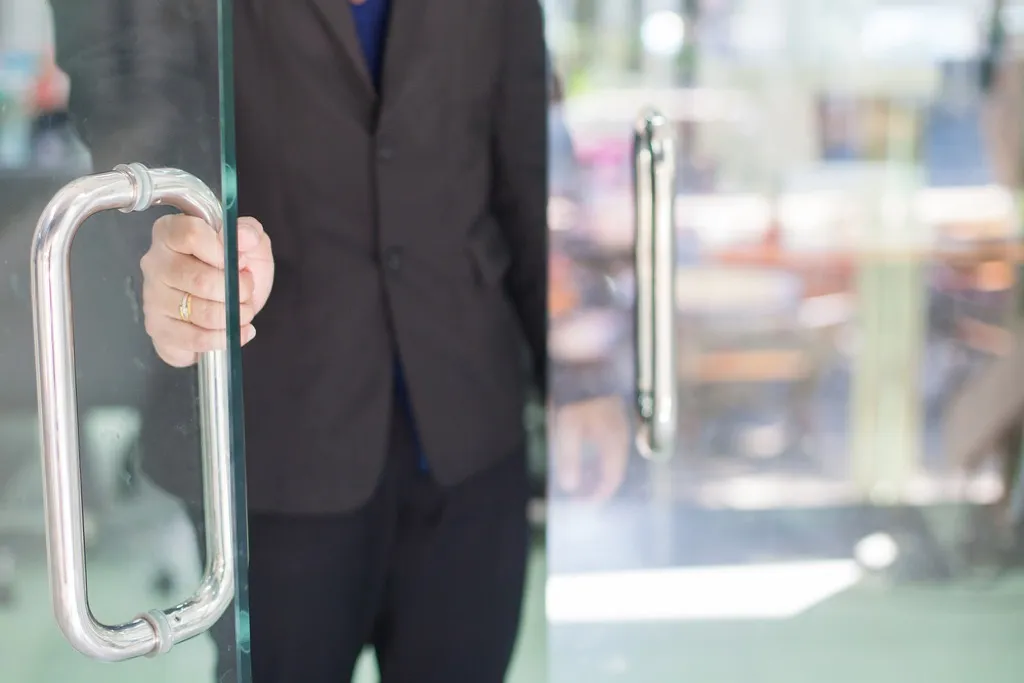
As wild as it may sound today, having a woman hold the door for her male coworker was once considered quite the etiquette faux pas. Today, however, “with the modern day workplace shifting into a gender-neutral atmosphere, it is acceptable for both men and women to hold doors for one another as a gesture of kindness,” says Tsai.
9
Always suiting or dressing up
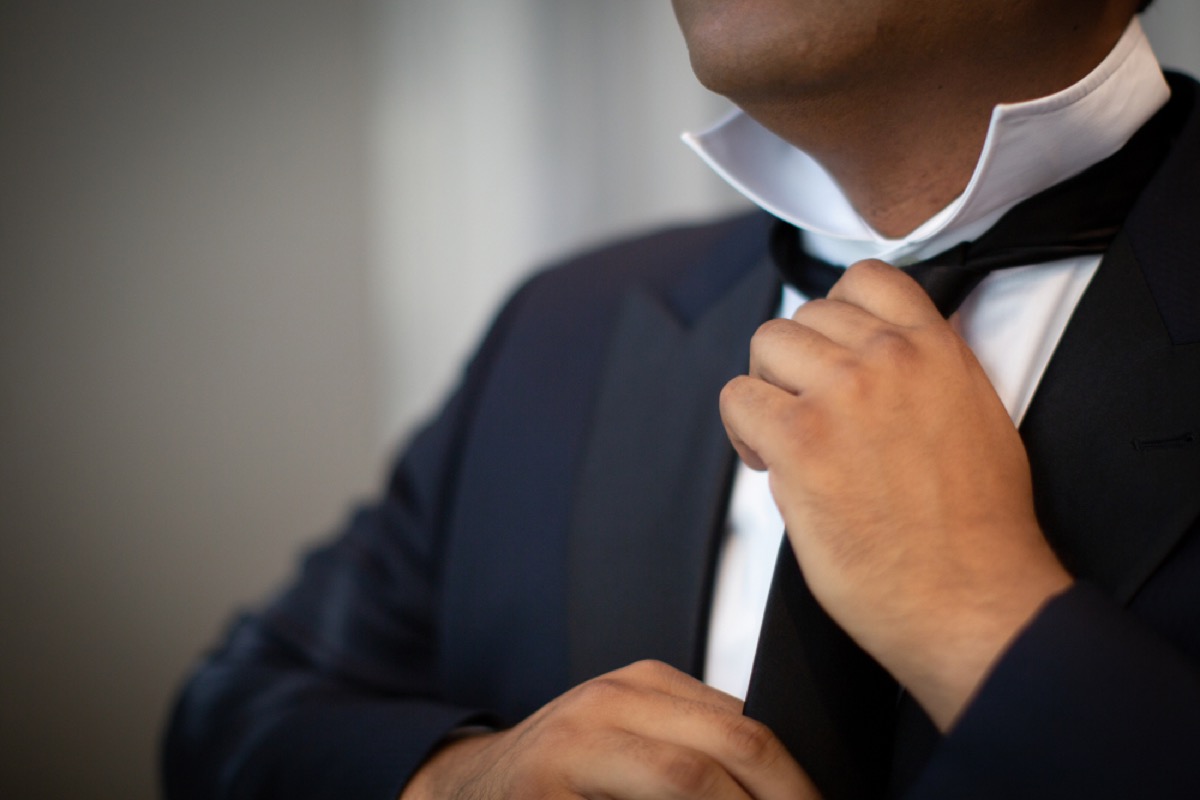
Though a suit or dress was once standard attire in many offices, you’re more likely to see smart casual clothing—or even jeans—these days. If Goldman Sachs can relax on their mandatory suit-and-tie policy, you can probably stop suiting up (unless your company dress code actually calls for it).
10
Hiding your pregnancy at work until it’s noticeable

Though covering for an employee during their maternity leave can cause potential hiccups, especially in smaller workplaces, women are no longer encouraged to keep their pregnancies hidden until the final hour. In fact, with anti-discrimination protections in place for full-time pregnant employees throughout the United States—like the Family and Medical Leave Act, first introduced in 1993 and expanded upon thereafter—pregnant employees are now encouraged to let their employer know about their pregnancy early on, rather than hiding it.
11
Never wearing headphones

While, at one point in time, wearing headphones at your desk might have been considered standoffish at best—and, in some offices, completely inappropriate altogether—that’s hardly the case today. Though you’d be hard-pressed to find a boss who loves seeing an employee wearing headphones during an in-person meeting, doing so at your desk while you work often means you’re simply sparing your coworkers the not-so-dulcet sounds of pop-up ads, auto-playing videos, or the webinar you’re dialed into.
12
Delivering all news in person

It used to be standard practice to let everyone know big news around the office—new hires, promotions, resignations, that sort of thing—in person. However, with more and more companies hiring remote workers, and travel becoming a standard part of countless jobs, it’s not always feasible to do so. If you’re working in Los Angeles and your boss is in Paris, there’s no expectation that you’d hop on a flight just to hand in your two weeks’ notice.
13
Never using your cell phone at work

Just a few decades ago, using your cell phone at your desk would have been considered pretty rude. Today, it’s not even noteworthy. Smartphones have become an increasingly common tool for workers—one many companies even provide their employees—meaning that glancing over and seeing your coworker on their phone doesn’t mean they’ve decided to ignore their work for the afternoon.
14
Following up interviews with handwritten thank you notes
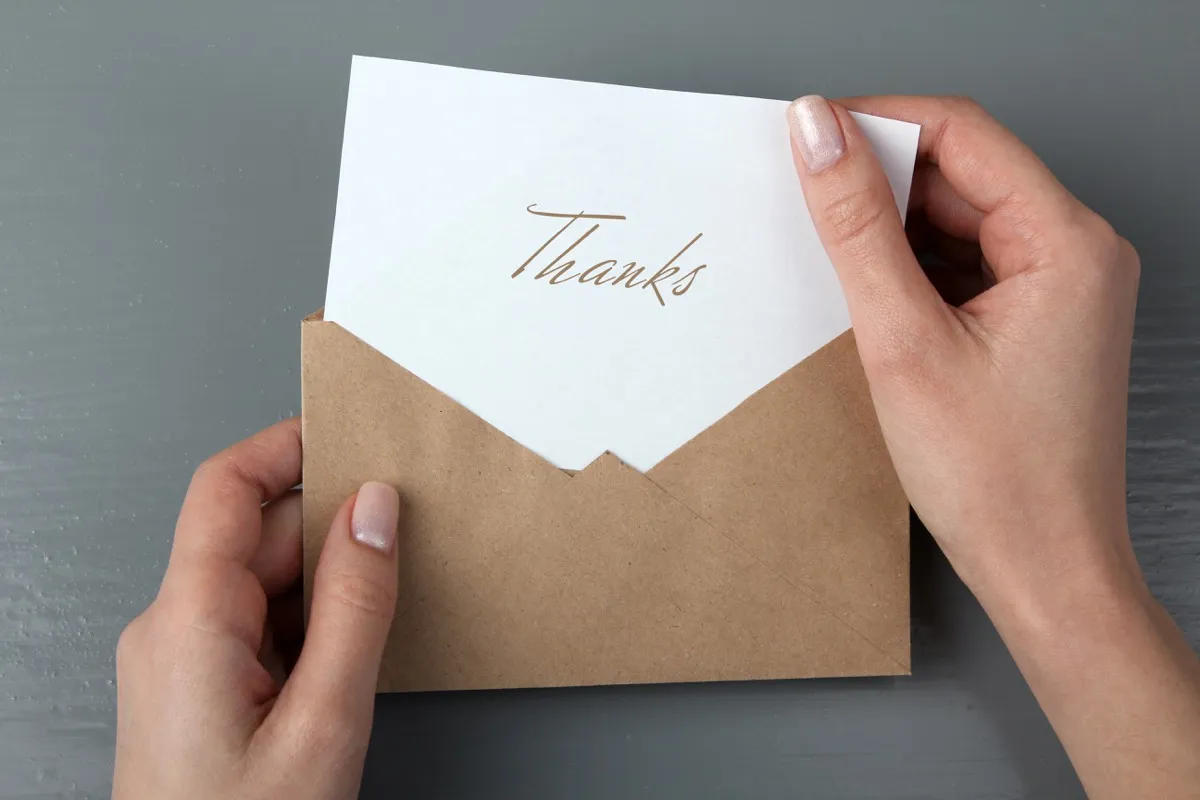
Though there’s something charming about receiving a handwritten thank you note, don’t assume that you’re tacitly required to send one after an interview. “Today, it is acceptable to follow up an interview with an email,” says Dupree. Since most business communications are done digitally these days, it may actually make a prospective employer’s day a bit easier if they don’t have to spend part of it opening snail mail.
15
Making enough coffee for the office if you’re making yourself a cup

While it was once commonplace to expect others to brew a full pot of coffee if they were making themselves a cup at work, that expectation has fallen by the wayside in recent years. With the rise of single-serving coffee makers, like K-Cup machines, you don’t have to worry about your coworkers feeling slighted if you haven’t made enough to share.
16
Always offering your business card

Once upon a time, back in the heyday of Rolodexes and brick-sized cell phones, offering your business card when meeting new clients at work was seen as standard practice. However, with the business card going the way of the dodo, and all the pertinent information that would have been contained therein now tacked on to someone’s email signature, there are few practical reasons to have business cards these days, much less share them with every new business acquaintance.
“In a social situation, it’s best to introduce yourself and share what you do,” says Dupree. “This way, you will see if there is an interest without having to force your business card on anyone.”
17
Never discussing your salary
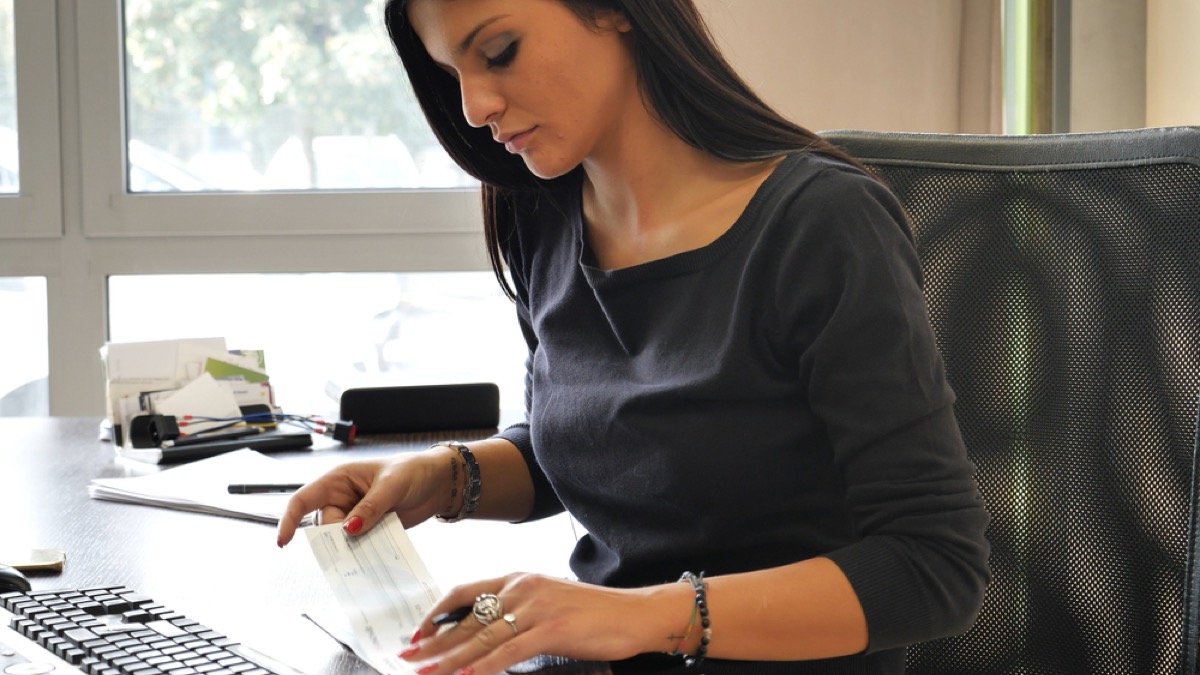
While bragging about a six-figure income to an assistant who’s making a quarter of that is certainly unkind, that doesn’t mean you should refrain from disclosing the amount on your paycheck entirely. In fact, there are legal protections in place if you choose to do so: According to the National Labor Relations Act of 1935, employees in the private sector can participate in “concerted activities for the purpose of collective bargaining or other mutual aid or protection.” In other words, most employees (with a few exceptions) can safely discuss their financial compensation with their coworkers.
In fact, some economists believe that doing so may be a key component to reducing gender- and race-based wage disparities in the workplace. As Angela Cornell, the director of the Labor Law Clinic at Cornell Law School, told The New York Times, having these discussions “minimizes the risk of disparate treatment claims and increases job satisfaction for workers.” And if you want to make the most of your workday, start with these 33 Genius Office Hacks for Getting More Done Quicker.
To discover more amazing secrets about living your best life, click here to follow us on Instagram!